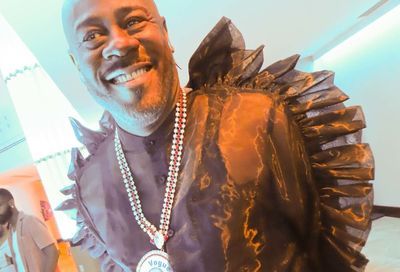Marriage equality, the Supreme Court and America’s embrace
It’s easy to forget that it wasn’t even 11 months ago President Barack Obama remained opposed to same-sex marriage.
“I believe that marriage is the union between a man and a woman. Now, for me as a Christian — for me — for me as a Christian, it is also a sacred union. God’s in the mix,” then-Sen. Obama said during a presidential campaign appearance at the Sanddleback Presidential Forum in April 2008. Although Obama repeatedly said gay couples should be entitled to rights and benefits through civil unions, he maintained marriage is between a man and a woman.
But since Obama announced on May 9, 2012 that he believes “same-sex couples should be able to get married,” the pace at which other politicians have followed has been staggering to even the most ardent supporters of marriage equality.
More than half the country now supports same-sex marriage, according to recent polling. Among those under the age of 30, support stands at more than 80 percent. In the weeks leading up to the Supreme Court’s historic arguments in two landmarks cases regarding California’s Proposition 8 and the Defense of Marriage Act, the number of politicians — particularly moderate Democrats — who have endorsed same-sex marriage has increased to such a pace they have ceased to gain headlines.
It began when Republican Sen. Rob Portman (Ohio) announced a “change of heart” earlier this month and became the first Senate Republican to support marriage equality after learning his son is gay. A few days after, former Secretary of State Hillary Clinton announced what many had long suspected: she too supports marriage equality.
And then, with the Supreme Court poised to consider whether same-sex couples in all 50 states have a constitutional right to marry, the flood began.
In the past week alone, Sens. Mark Begich (Alaska), Tim Kaine (Va.), Kay Hagan (N.C.), Claire McCaskill (Mo.), Jon Tester (Mont.) and Mark Warner (Va.) all announced their support for same-sex marriage, primarily through statements on social media platforms. That leaves only nine Democratic senators who do not support same-sex marriage, including Sens. Tom Carper (Del.), Bob Casey (Pa.), Joe Donnelly (Ind.), Heidi Heitkamp (N.D.), Tim Johnson (S.D.), Mary Landrieu (La.), Joe Manchin (W.Va.), Bill Nelson (Fla.) and Mark Pryor (Ark.).
In essence, it is no longer news for a Democrat to support same-sex marriage. And for those who have yet to declare their support, they are to the right of Portman and former Vice President Dick Cheney on this issue.
While Portman remains the only Senate Republican to have endorsed same-sex marriage, others have signaled that may soon change. According to the Alaska Star, Republican Sen. Lisa Murkowski (Alaska) described her view on same-sex marriage much as Obama described his a year ago.
“The term ‘evolving view’ has been perhaps overused, but I think it is an appropriate term for me to use,” Murkowski said.
The Republican Party itself has signaled a renewed attempt to be more inclusive toward those with differing views on same-sex marriage. In an interview with USA Today, Republican National Committee Chairman Reince Priebus said that while the GOP’s platform opposes same-sex marriage, they don’t “need to act like Old Testament heretics” and must “strike a balance between principle and grace and respect.”
The scramble to be on the right side of history was not lost on the Supreme Court justices this week.
“As far as I can tell, political figures are falling over themselves to endorse your side of the case,” Chief Justice John Roberts said Wednesday to the attorney for Edith Windsor, the 83-year-old lesbian widow at the center of the DOMA challenge.
Some have welcomed these new allies to the LGBT fold, while others have criticized what they call political opportunism. Portman in particular has faced criticism from some in the LGBT community for only supporting same-sex marriage after it directly impacted his family. But others have pointed to the enduring words of one of the movement’s most iconic figures.
“Harvey Milk was right,” Sen. Tammy Baldwin (D-Wisc.), the chamber’s only out member, told Metro Weekly. “Come out, come out wherever you are and that’s how you’re going to change the world.”
But the rapid pace at which these leaders have evolved begs a question: where were they before?
“The Clintons have always been phonies and opportunists and for Bill Clinton to proclaim the sanctity of marriage and sign DOMA while cigar-fucking his intern tells you a lot about him,” Andrew Sullivan — no fan of the Clintons — wrote today. “On no issue were they as shameless as on this one – portraying themselves as civil rights advocates while kicking those of us fighting for equality squarely in the groin.”
Accompanying Sullivan’s blog post was a montage of Democratic senators, including Hillary Clinton, Harry Reid and Dick Durbin, discussing their opposition to same-sex marriage on the floor of the Senate in the mid-2000s.
Nevertheless, the Democratic Party’s decision to write support for marriage equality into their national party platform last summer and Obama’s support has all but assured that no viable Democrat will be able to run for the party’s presidential nomination again without supporting same-sex marriage. Indeed, the four most likely to seek the nomination in 2016 — Hillary Clinton, Joe Biden, Maryland Gov. Martin O’Malley and New York Gov. Andrew Cuomo — all support marriage equality. While less than a decade ago the most advocates could hope for were Democratic politicians to openly support civil unions, it now draws more attention when they don’t support marriage rights.
No matter how the Supreme Court rules in June, one thing was clear after this week: however these leaders came to their current positions, it’s no longer radical to believe gays and lesbians deserve full equality. And it’s only a matter of time.
[Photo: Pro-marriage equality demonstrations outside the Supreme Court (Credit: Todd Franson/Metro Weekly).]
Support Metro Weekly’s Journalism
These are challenging times for news organizations. And yet it’s crucial we stay active and provide vital resources and information to both our local readers and the world. So won’t you please take a moment and consider supporting Metro Weekly with a membership? For as little as $5 a month, you can help ensure Metro Weekly magazine and MetroWeekly.com remain free, viable resources as we provide the best, most diverse, culturally-resonant LGBTQ coverage in both the D.C. region and around the world. Memberships come with exclusive perks and discounts, your own personal digital delivery of each week’s magazine (and an archive), access to our Member's Lounge when it launches this fall, and exclusive members-only items like Metro Weekly Membership Mugs and Tote Bags! Check out all our membership levels here and please join us today!





















